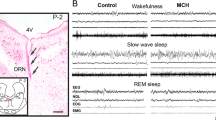Abstract
In conscious rats, γ2-melanocyte-stimulating hormone (γ2-MSH) dose-dependently increases blood pressure and heart rate, whereas adrenocorticotropin-(1–24) [ACTH-(1–24)] dose-dependently decreases blood pressure, an effect which was accompanied by a reflectory tachycardia. As the exact mechanism involved in these cardiovascular effects of the two melanocortins is as yet not known, we undertook a series of experiments to investigate the possibility that these peptides have modulating or direct effect on the cardiovascular system of the rat. In pithed rats γ2-MSH, administered intravenously (i.v.) in doses of 5–200 nmol/kg, had no significant effect on systolic and diastolic blood pressure and on heart rate, whereas ACTH-(1–24), 5–500 nmol/kg, i.v., dose-dependently decreased blood pressure and increased heart rate. Infusion of γ2-MSH, 10–8 M, or ACTH-(1–24), 10–6 M, in the isolated perfused rat heart did not significantly affect left ventricular pressure or coronary flow. Pretreatment with either γ2-MSH or ACTH-(1–24) did not modify the responsiveness of the myocardium and coronary vasculature to salbutamol and phenylephrine. Neither γ2-MSH nor ACTH-(1–24) did affect the vascular contractile machinery of skinned vascular smooth muscles of the rabbit with respect to Ca2+ handling in the cell, as measured by its sensitivity to exogenously applied Ca2+. γ2-MSH had no effect on blood pressure and heart rate in pithed rats in which postganglionic sympathetic outflow was stimulated by 1,1-dimethyl-4-phenylpiperazinium (DMPP), nor in pithed rats in which preganglionic sympathetic outflow was stimulated electrically. A dose of 15 nmol/kg ACTH-(1–24) had no significant influence on preganglionic outflow to the cardiac and vascular structures in pithed rats. These data show that γ2-MSH does not exert its cardiovascular effects via a peripheral site of action at the level of the vascular system and the heart, nor directly on pre- or postganglionic sympathetic outflow. These results are in support for the notion that the peptide acts via a brain region localised outside the blood-brain barrier. The acute depressor effect of ACTH-(1–24), however, seems to be due to a direct effect on the vasculature in the periphery.
Similar content being viewed by others
Author information
Authors and Affiliations
Additional information
Received: 28 October 1997 / Accepted: 23 April 1998
Rights and permissions
About this article
Cite this article
Van Bergen, P., Vleeming, W., Van Heijst, B. et al. A study on possible modulating and direct effects of γ2-MSH and ACTH-(1–24) on the cardiovascular system of the rat. Naunyn-Schmiedeberg's Arch Pharmacol 358, 220–229 (1998). https://doi.org/10.1007/PL00005246
Issue Date:
DOI: https://doi.org/10.1007/PL00005246




